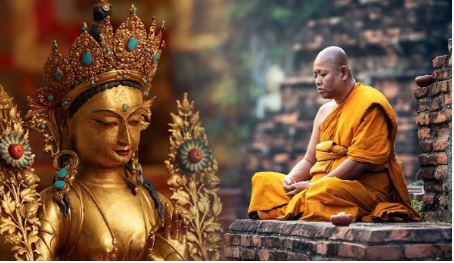The Basic Teachings of Buddha which are core to Buddhism are:
• The Three Universal Truths;
• The Four Noble Truths; and
• The Noble Eightfold Path.
We sum up these values as such. Notice that these principals are really disciplines that those who choose to take this path could choose to adhere.
II. THE THREE UNIVERSAL TRUTHS
- Nothing is lost in the universe
- Everything Changes
- The Law of Cause and Effect
The three trainings or practices
Sila: Virtue, good conduct, morality. This is based on two fundamental principles: The principle of equality: that all living entities are equal. The principle of reciprocity: This is the “Golden Rule” in Christianity – to do unto others as you would wish them to do unto you. It is found in all major religions.
Samadhi: Concentration, meditation, mental development. Developing one’s mind is the path to wisdom which, in turn, leads to personal freedom. Mental development also strengthens and controls our mind; this helps us maintain good conduct.
Prajna: Discernment, insight, wisdom, enlightenment. This is the real heart of Buddhism. Wisdom will emerge if your mind is pure and calm.
III. THE FOUR NOBLE TRUTHS
Dukkha: Suffering exists: Life is suffering. Suffering is real and almost universal. Suffering has many causes: loss, sickness, pain, failure, and the impermanence of pleasure.
Samudaya: There is a cause of suffering. Suffering is due to attachment. It is the desire to have and control things. It can take many forms: craving of sensual pleasures; the desire for fame; the desire to avoid unpleasant sensations, like fear, anger or jealousy.
Nirodha: There is an end to suffering. Attachment can be overcome. Suffering ceases with the final liberation of Nirvana (Nibbana). The mind experiences complete freedom, liberation and non-attachment. It lets go of any desire or craving.
Magga: In order to end suffering, you must follow the Eightfold Path. There is a path for accomplishing this.
The Five Precepts
- Do not kill. This is sometimes translated as “not harming” or an absence of violence.
- Do not steal. This is generally interpreted as including the avoidance of fraud and economic exploitation.
- Do not lie. This is sometimes interpreted as including name-calling, gossip, etc.
- Do not misuse sex. For monks and nuns, this means any departure from complete celibacy. For the laity, adultery is forbidden, along with any sexual harassment or exploitation, including that within marriage. The Buddha did not discuss consensual premarital sex within a committed relationship, thus, Buddhist traditions differ on this. Most Buddhists, probably
influenced by their local cultures, condemn same-sex sexual activity regardless of the nature of the relationship between the people involved. - Do not consume alcohol or other drugs. The main concern here is that intoxicants cloud the
mind. Some have included as a drug other methods of divorcing ourselves from reality —
For a more indepth breakdown, please visit https://www.unhcr.org/50be10cb9.pdf

